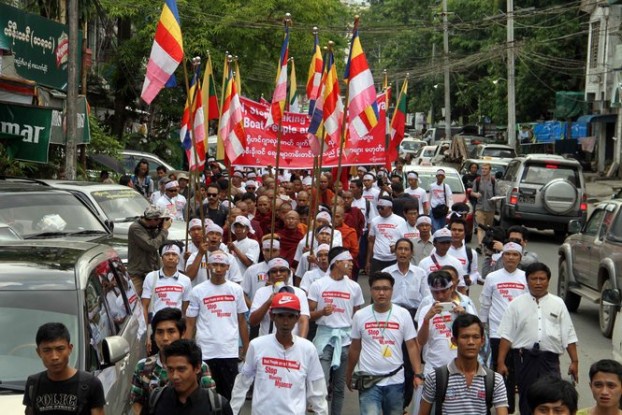The European Union said on Wednesday Burma needed “space” to deal with human rights abuses in its restive northwest, adding it would respect the call by country leader Aung San Suu Kyi to avoid the term “Rohingya” to describe persecuted Muslims there.
The statement exposes a rift in the West’s approach to the sensitive issue, standing in contrast with the United States, which said it would continue to use the term, citing respect for the right of communities to choose what they should be called.
Members of the 1.1 million group, who identify themselves by the term Rohingya, are seen by many Burmese Buddhists as illegal immigrants from Bangladesh. The term is a divisive issue.
Tensions around the Muslim minority are rising. This week, Suu Kyi told the United Nations Human Rights investigator visiting the country that the government would not use the term because it was inflammatory.
Some 120,000 Rohingya remain displaced in squalid camps since fighting erupted in Arakan State between Buddhists and Muslims in 2012. Thousands have fled persecution and poverty. The UN said on Monday the abuses, which include executions and torture, together may amount to crimes against humanity.
“We understand that the term ‘Rohingya’ is emotionally charged in Myanmar [Burma] and we have heard the call of the government to avoid creating tension by using polarising terminology,” Roland Kobia, the EU ambassador to Burma, told reporters.
“So we ought to give political space to initiatives to gradually find a solution to this protracted issue.”
Suu Kyi’s administration last week tabled a new term for the Rohingya — “Muslim community in Rakhine [Arakan] State” — but the description has quickly run into opposition.
The Arakan National Party (ANP), formed by hardline Arakanese Buddhists who enjoy considerable following in the state, said the government was biased and rejected the new term.
“We consider that using the new term … is tantamount to meaning that they are natives of Rakhine region by ignoring the original place of these Bengali people,” the party said in a statement.
The previous military-linked government referred to the group as “Bengalis”, implying they were illegal immigrants from Bangladesh, though many have lived in Burma for generations.
Wai Wai Nu, a Rohingya activist from Women Peace Network Arakan, said the government should protect, listen to and consult with ethnic minorities. She wanted to ask it: “Why are you denying us our identity…and not taking a feasible, constructive and inclusive step to move forward?
[related]
“The government should address the targeted persecution and discrimination against minorities and ensure protection of their rights by respecting their ethnicity, identity and name,” she said.
Yanghee Lee, the UN Special Rapporteur on Human Rights in Burma, is touring the country on her first visit since Suu Kyi took power. On Wednesday, she was in Arakan state to meet officials and visit a camp for local people displaced by violence.
Suu Kyi, who starts a visit to Thailand on Thursday, has formed a committee to “bring peace and development” to the state in May, but its plans are not clear.



